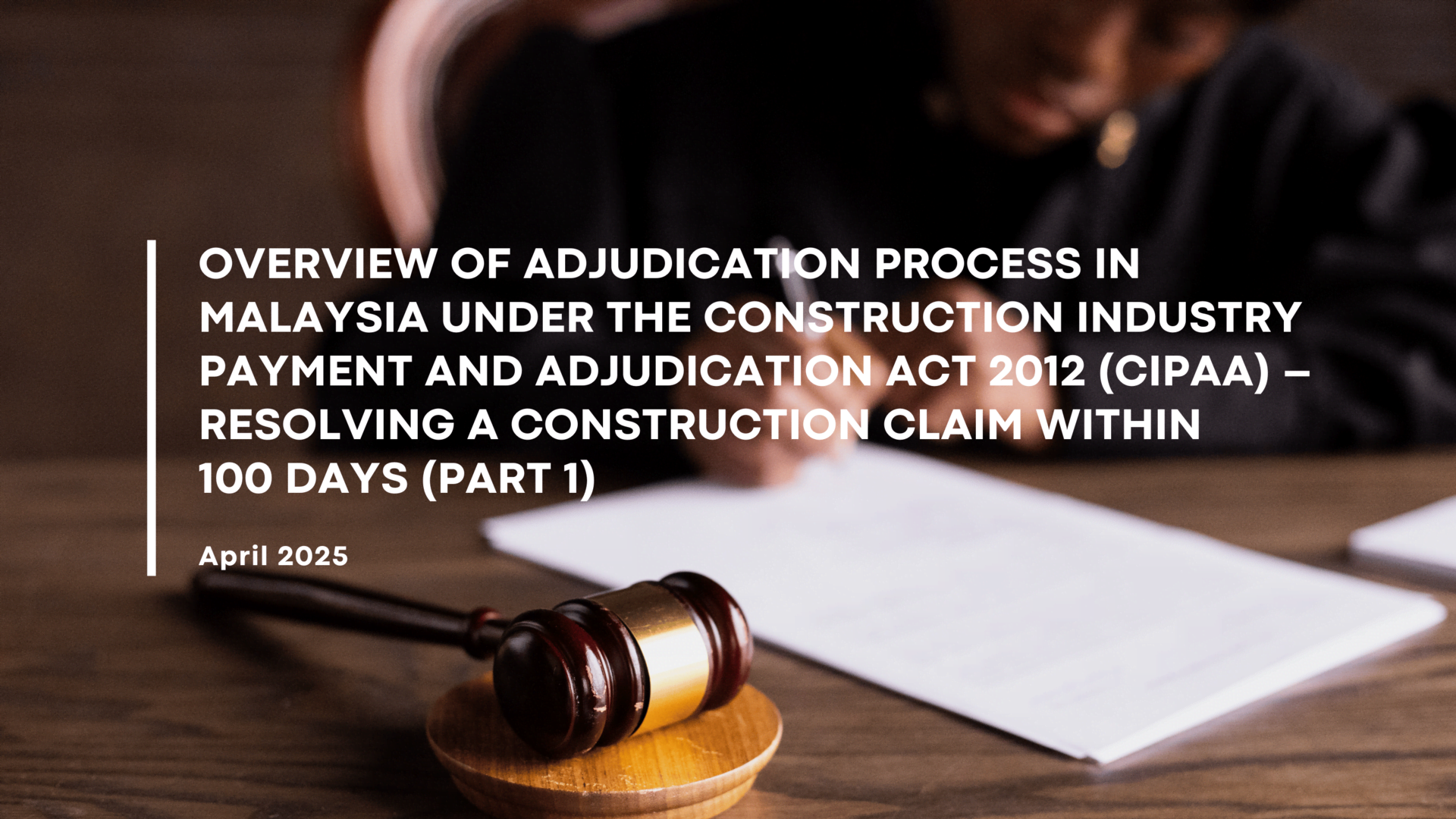A. Introduction to Adjudication under the Construction Industry Payment and Adjudication Act 2012
The Construction Industry Payment and Adjudication Act 2012 (“CIPAA”) is a legal framework in Malaysia designed to provide a mechanism for speedy dispute resolution through adjudication, alleviate payment problems that presently prevails pervasively which stifles cash flow in the construction industry, and ensure that contractors and sub-contractors are not deprived of cash flow. It applies to both interim payments and final payment disputes as long as such payment claims are related to a construction contract.
The CIPAA applies to all construction contracts made in writing carried out in Malaysia including construction contracts entered with the Government. However, the CIPAA does not apply to construction contracts entered by individuals for construction works less than four storeys high intended for personal occupation.
This article provides an overview of the adjudication process under the CIPAA.
B. Key Steps in Adjudication
Step 1: Serving the Payment Claim
The process begins when an unpaid party (“Claimant”) who is owed payment under a construction contract serves a Payment Claim in writing on the other party (“Respondent”). The Payment Claim must include:
- The amount claimed and due date for payment of the amount claimed;
- Details to identify the cause of action including the provision in the construction contract to which the payment relates
- Description of the work or services to which the payment relates; and
- A statement that it is made under CIPAA.
The Claimant must identify the cause of action and all the relevant clauses and/or provisions it intends to rely under the construction contract, to which the payment relates as the Adjudicator’s jurisdiction is limited to the matters referred to in the Payment Claim.
Step 2: Serving the Payment Response
The non-paying party being the Respondent who admits to the Payment Claim served on him shall serve a Payment Response within ten working days of the receipt of the Payment Claim. The Payment Response may dispute the claim either wholly or partly, stating the amount disputed and the reason for the dispute.
Failure to serve a Payment Response within the stipulated time is deemed that the Respondent disputes the entire Payment Claim.
Nevertheless, it may be worthwhile to submit a Payment Response as it does give an impression on the Adjudicator that the Respondent does not have a good case.
Step 3: Initiating Adjudication
If the dispute remains unresolved after the expiry of the period to serve a Payment Response under Section 6(3) of the CIPAA, the Claimant has a right to refer the dispute to adjudication. The Claimant may initiate adjudication proceedings by serving a written Notice of Adjudication to the Respondent and the appointing authority, Asian International Arbitration Centre (“AIAC”). The Notice of Adjudication must include:
- Nature and description of the dispute;
- The relief or remedy sought; and
- Supporting documents (if any).
The Claimant shall also within seven days from the date of service of the Notice of Adjudication, register the adjudication at the AIAC by serving a notice on the Director of AIAC together with a non-refundable registration fee payable to AIAC.
Step 4: Appointment of the Adjudicator
An Adjudicator may be appointed in the following manner:
- By agreement of the parties in dispute within ten working days from the service of the notice of adjudication by the Claimant. The Claimant shall notify the Adjudicator to be appointed under paragraph (a) in writing and provide him a copy of the Notice of Adjudication. Or
- By the Director of AIAC:
- Upon the request of either party in dispute if there is no agreement of the parties under paragraph (a); or
- Upon the request of the parties in dispute.
The Director of AIAC shall appoint an Adjudicator under paragraph (b) within five working days upon receipt of a request and shall notify the parties and Adjudicator in writing.
Step 5: Adjudication Proceedings
Upon the confirmation of the appointment of Adjudicator, the Adjudicator would direct parties on the timeline of the adjudication proceedings and other procedural aspects of adjudication proceedings.
- Adjudication Claim: The Claimant shall, within ten working days from receipt of the acceptance of the appointment of the Adjudicator serve a written Adjudication Claim containing the following to the Respondent and Adjudicator:
- Nature and description of the dispute;
- Remedy sought; and
- Supporting documents (if any).
- Adjudication Response
- Upon receipt of the Adjudication Claim, the Respondent shall, within ten working days serve a written Adjudication Response to the Claimant and Adjudicator, which shall answer the adjudication claim with any supporting documents.
- In the event the Respondent fails to serve the Adjudication Response, the Claimant may proceed with the adjudication after expiry of the time specified.
- Further, the Respondent is not precluded from raising its defences in its Adjudication Response which had not been previously raised in its Payment Response.
- Adjudication Reply
- Upon receipt of the Adjudication Response, the Claimant may, within five working days serve a written Adjudication Reply to the Respondent and Adjudicator with any supporting documents.
Step 6: Delivery of the Adjudication Decision
- The adjudicator must deliver a written decision within:
- 45 working days from the service of the Adjudication Response or Adjudication Reply to the adjudication response, whichever is later;
- 45 working days from the expiry of the period prescribed for the service of the adjudication response if no adjudication response is received; or
- Such further time as agreed to by the parties.
The Adjudicator must comply with the strict timelines under section 12(2) of CIPAA.
C. Practical Considerations for Adjudication
1. To ascertain where the site location of the dispute is. The computation of “Working Days” under section 4 of the CIPAA is based on where the site located: Encorp Iskandar Development Sdn Bhd v Konsortium Ipmnies Merz Sdn Bhd [2024] 6 MLJ 821 at [49] to [50].
2. Pay When Paid Clause (Conditional Payment) is null and void in adjudication proceedings under section 35 of the CIPAA: JDI Builtech (M) Sdn Bhd v Danga Jed Development Malaysia Sdn Bhd (dulu dikenali sebagai Greenland Danga Bay Sdn Bhd) [2024] MLJU 414
3. The CIPAA applies to all construction contracts made in writing, relating to construction work carried out wholly or partly within the territory of Malaysia including a construction contract entered into by the government or construction consultancy contract”.
4. A non-paying party’s set-off shall only operate to reduce or zerorise an unpaid party’s claim and not as a form of counterclaim: Tenaga Poly Sdn Bhd v Crest Builder Sdn Bhd (Originating Summons No. WA-24C-44-06/2016) and Tera Va Sdn Bhd v Ayam Bintang Istimewa Sdn Bhd [2024] 6 MLJ 849 at [69]
5. The CIPAA does not apply to a construction contract entered into by a natural person for any construction work in respect of any building which is less than four storeys high and which is wholly intended for his occupation.
6. The right of the unpaid party to refer the dispute to adjudication must be brought in within the limitation period under the Limitation Act (1953) [for Peninsular Malaysia], Sabah Limitation Ordinance or Sarawak Limitation Ordinance.
Whilst the CIPAA provides a comprehensive and speedy mechanism for resolution of construction disputes, it is only intended to provide “temporary finality” to alleviate cash flow issues in the construction industry through the rubric of “pay now, argue later” mechanism. The adjudication decision is binding and enforceable, but it is subject always to the dispute between the parties being finally determined by arbitration or the court .
© TSL Legal
This article is intended to provide general information only and does not constitute legal advice. It should not be used as a substitute for professional legal consultation. We recommend seeking legal advice before making any decisions based on the information available in this article. TSL Legal fully disclaims responsibility for any loss or damage which may result from relying on this article.
Further Information
Should you have any questions on the implications of this Act or how this development may affect you or your business, please get in touch with the following person:

